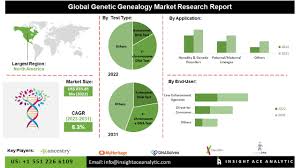Unveiling Ancestral Secrets: Exploring the Power of Genealogical DNA Tests
The Power of Genealogical DNA Tests
Genealogical DNA tests have revolutionized the field of genealogy by providing individuals with a powerful tool to uncover their ancestry and connect with distant relatives. These tests analyze an individual’s unique genetic code to reveal insights into their ethnic background, migration patterns, and familial relationships.
One of the key benefits of genealogical DNA testing is its ability to break down brick walls in traditional genealogical research. By comparing DNA markers with databases of other test-takers, individuals can discover genetic matches that may lead to new family connections and ancestral discoveries.
There are several types of genealogical DNA tests available, including Y-DNA tests, mtDNA tests, and autosomal DNA tests. Each type provides different types of information about an individual’s ancestry and can be used to explore different branches of their family tree.
Y-DNA tests trace direct paternal lines, revealing information about a person’s father’s father’s father, and so on. MtDNA tests, on the other hand, trace direct maternal lines, providing insights into a person’s mother’s mother’s mother, and beyond. Autosomal DNA tests examine a person’s entire genome and can uncover connections to relatives across all ancestral lines.
Genealogical DNA testing has opened up new avenues for research and collaboration within the genealogy community. By sharing test results in online databases and participating in genetic genealogy projects, individuals can expand their family trees, confirm existing research findings, and discover shared ancestors with newfound cousins.
In conclusion, genealogical DNA tests offer a fascinating glimpse into our genetic past and have the potential to connect us with our long-lost relatives. Whether you’re just beginning your genealogical journey or seeking to enhance your existing research, consider exploring the power of DNA testing to unlock the mysteries of your ancestry.
6 Essential Tips for Making the Most of Your Genealogical DNA Test
- Research and choose a reputable DNA testing company.
- Understand the different types of genealogical DNA tests available.
- Consider the privacy implications before taking a DNA test.
- Connect with potential relatives through DNA matching tools provided by the testing company.
- Use additional genealogical research methods to complement your DNA results.
- Consult with genetic genealogy experts for help interpreting complex DNA data.
Research and choose a reputable DNA testing company.
When embarking on a genealogical DNA test, it is crucial to conduct thorough research and select a reputable DNA testing company. Choosing a well-established and reliable company ensures the accuracy and integrity of your test results, providing you with trustworthy information about your ancestry and genetic connections. Look for companies with a proven track record in genetic testing, positive customer reviews, and transparent policies regarding data privacy and security. By investing time in selecting the right DNA testing provider, you can confidently navigate the world of genetic genealogy and uncover valuable insights into your family history.
Understand the different types of genealogical DNA tests available.
To make the most of genealogical DNA testing, it is crucial to understand the various types of tests available. Different types of genealogical DNA tests, such as Y-DNA, mtDNA, and autosomal DNA tests, provide distinct insights into different aspects of your ancestry. By familiarizing yourself with the unique characteristics and purposes of each test, you can effectively leverage their capabilities to uncover specific information about your paternal and maternal lines, as well as connections to relatives across all ancestral branches. Understanding the differences between these tests will empower you to choose the most suitable option based on your research goals and maximize the potential for discovering valuable ancestral connections.
Consider the privacy implications before taking a DNA test.
Before embarking on a genealogical DNA test, it is crucial to carefully consider the privacy implications associated with sharing your genetic information. While DNA testing can provide valuable insights into your ancestry and familial connections, it also involves sharing sensitive data that may have long-term implications. Be mindful of how your genetic information could be used or shared by testing companies, and take steps to understand and protect your privacy rights before proceeding with a DNA test.
Connect with potential relatives through DNA matching tools provided by the testing company.
By utilizing DNA matching tools offered by genealogical testing companies, individuals can connect with potential relatives and uncover hidden branches of their family tree. These tools compare an individual’s genetic markers with those of other test-takers in the company’s database, identifying shared segments of DNA that indicate a familial relationship. By exploring these matches and reaching out to newfound relatives, genealogists can collaborate, exchange information, and piece together their shared ancestry. DNA matching tools provide a valuable opportunity to expand one’s family network and deepen their understanding of their genetic heritage.
Use additional genealogical research methods to complement your DNA results.
When delving into genealogical DNA testing, it is essential to supplement your results with additional genealogical research methods. While DNA tests can provide valuable insights into your ancestry, combining them with traditional research techniques such as exploring historical records, conducting interviews with family members, and building a comprehensive family tree can offer a more holistic understanding of your genealogy. By integrating various research approaches, you can enrich your genetic findings and uncover a more detailed picture of your family history.
Consult with genetic genealogy experts for help interpreting complex DNA data.
When delving into the realm of genealogical DNA testing, it is highly recommended to seek guidance from genetic genealogy experts to assist in interpreting complex DNA data. These professionals possess the expertise and knowledge to navigate intricate genetic information, unravel familial connections, and provide valuable insights into your ancestry. Consulting with genetic genealogy experts can help you make sense of your test results, identify significant matches, and uncover hidden family ties that may not be immediately apparent. Their guidance can enhance your understanding of genetic genealogy and ensure that you extract the most meaningful information from your DNA test results.

